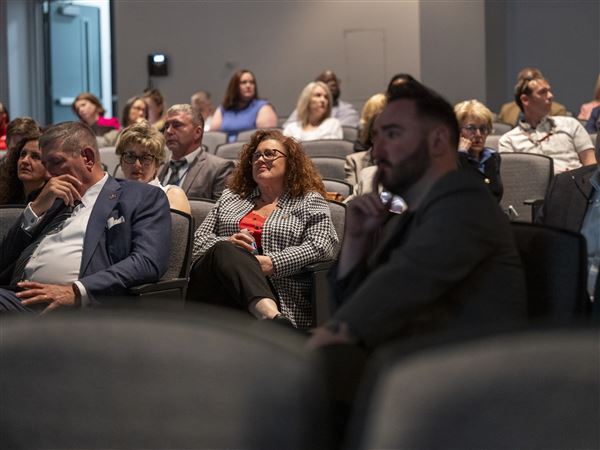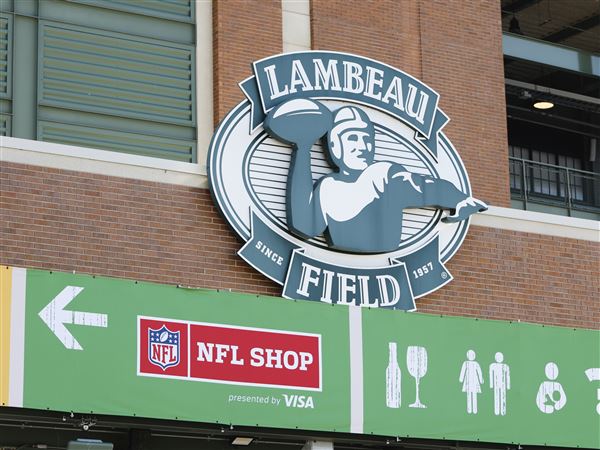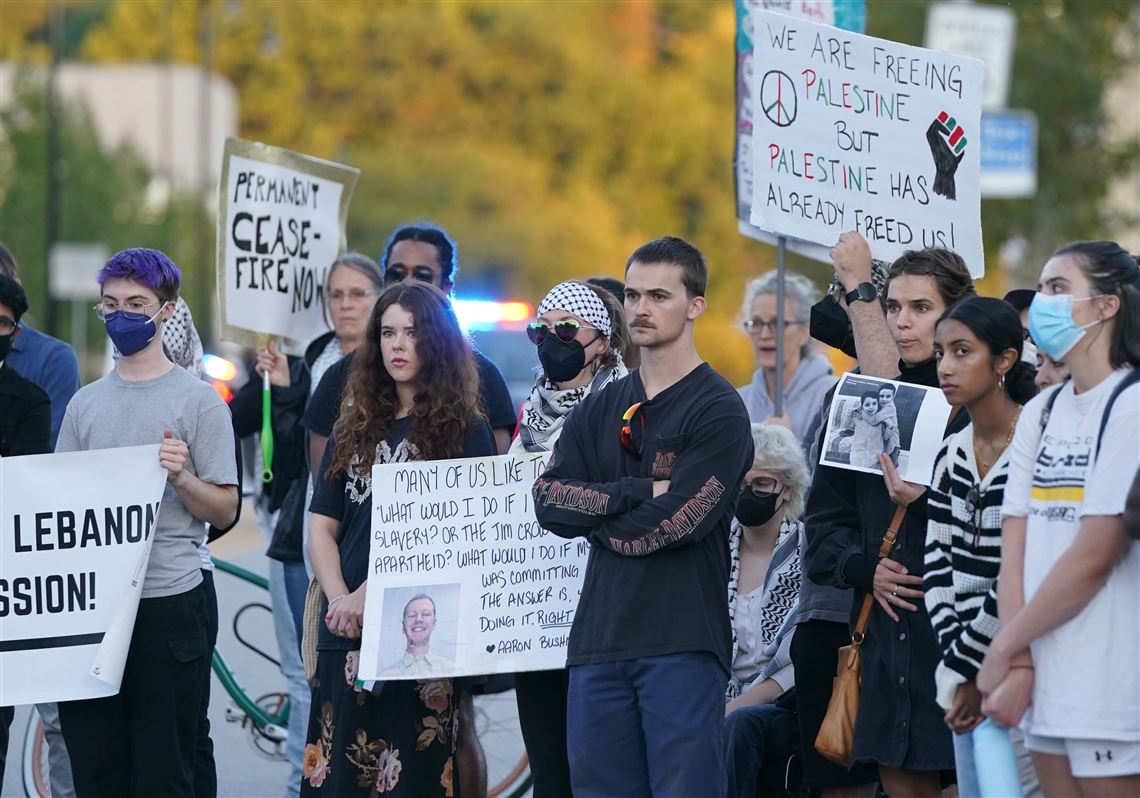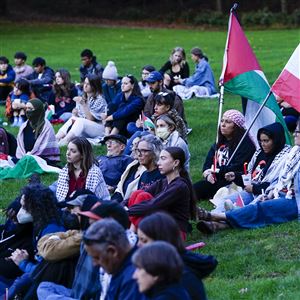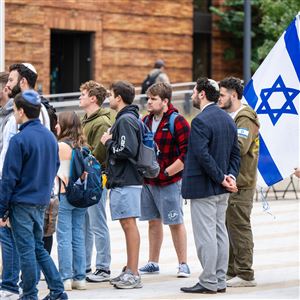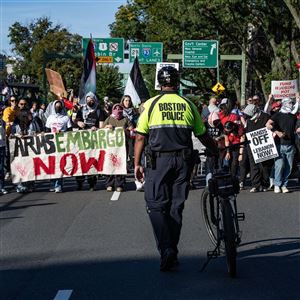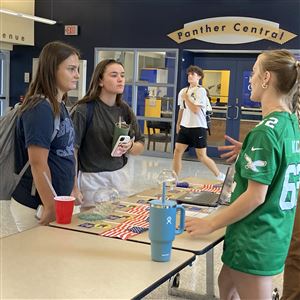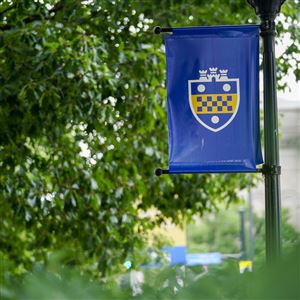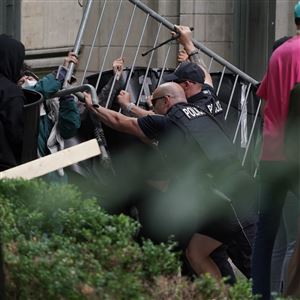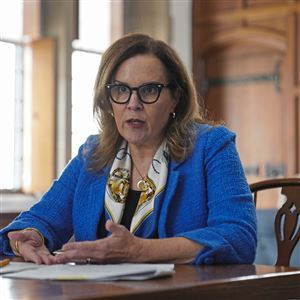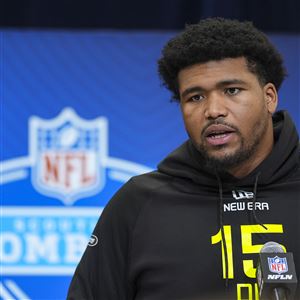College feels different to Ben Koby than it did a year ago.
There’s a lack of trust between peers, reflected Mr. Koby, a Jewish student at Carnegie Mellon University.
That trust fled when the terrorist organization Hamas launched a surprise attack on Israel on Oct. 7, 2023, killing hundreds of civilians and taking others hostage. Israel struck back, and the yearlong war in Gaza has since seen the deaths of more than 40,000 Palestinians and 1,700 Israelis.
In America, the war sent universities into a tailspin as their campuses became hotbeds for disagreement and demonstrations. The conflict has led to tense, and sometimes violent, collegiate environments that illustrate both free speech and safety concerns.
“You don’t really trust people initially anymore,” Mr. Koby said. “There’s a heightened sense of anxiety. Your threat perception is higher.”
A majority of college students surveyed this year — including those at Pitt, Duquesne University and CMU — say they sympathize more with the Palestinians than the Israelis in the conflict.
Across the country, many students have expressed that sympathy with advocacy: pushing for their schools to divest from companies and institutions with ties to Israel, and taking to the streets to hold signs reading “ceasefire now” while chanting “from the river to the sea, Palestine will be free.”
They’ve also set up encampments, occupied university buildings and clashed with police. Commencement ceremonies have been canceled, university administrators have resigned and reports of on-campus antisemitism have skyrocketed.
In Pittsburgh, student activism has been largely centered at and around Pitt. Though some student-led protests have remained peaceful, two have resulted in arrests, defacement of the Cathedral of Learning or clashes with police.
And this semester, three people wearing Jewish clothing or jewelry have been assaulted on or around Pitt’s campus.
A year into the war, it has become increasingly clear that the conflict is reshaping public perceptions of higher education.
It’s also posing a “different level of challenge” to university leaders — something University of Pittsburgh Chancellor Joan Gabel acknowledged in a written statement to the Post-Gazette last week.
“The nature of a university environment is to ask the hardest of questions and explore and push boundaries as part of the expansion of knowledge,” Ms. Gabel said. “This often includes disagreement that can be uncomfortable. But that should never create a question of safety, make anyone feel unsafe, or create an environment that tolerates or condones any level of hatred.”
Mira Sucharov, a professor at Carleton University in Canada who studies Israeli-Palestinian relations, wasn’t surprised to see this issue become one of the largest campus activism movements of the 21st century.
Students already cared about this issue, she said, and Oct. 7, 2023, “galvanized the attention” of both those who support Palestine and those who support Israel.
“Given the shock of the attack of Oct. 7 — and the scale of that of that attack on Israelis — and given the scale of Israel's attacks on Gaza and the rising death toll, it's not at all surprising that this issue has remained so front and center for young people [and] students who are looking to make a difference in the world,” Ms. Sucharov said. “Things have not been this bad between Israelis and Palestinians since I was a student, which was over 30 years ago.”
Free speech spotlighted
Since the Israel-Hamas War began, the delicate balance between free speech rights and safety protections on college campuses has been thrust into the spotlight.
Public universities like Pitt are bound by the First Amendment and must guarantee free speech rights to students, but they can impose some content-neutral restrictions. These “time, manner and place” restrictions can limit things like noise or the number of students who can protest in a given area.
Private universities, on the other hand, can limit students’ speech, though many choose to grant their students the free speech rights afforded in the Bill of Rights. CMU, for example, allows students to peacefully protest and make speeches on campus — though the university did implement a new policy this semester that requires groups with more than 25 people to register events involving “expressive activity.” That policy has received pushback from some students.
Over the past year, universities have been criticized for both restricting student speech related to the Israel-Palestine conflict and not doing enough to enforce their conduct policies. While the First Amendment protects offensive speech, crimes like harassment and vandalism don’t fall under its purview, and can therefore be disciplined on campus.
Zachary Greenberg, faculty legal defense and student association counsel at the Foundation for Individual Rights and Expression, said he would give most schools a “failing grade” for their handling of the year’s heightened activism and students’ understanding of what is and isn’t permitted. Philadelphia-based FIRE tracks the pulse of campus free speech nationwide.
“I think a lot of what we see on college campuses demonstrates that not only students, but also administrators, may have a misunderstanding of the First Amendment,” he said.
Robert Cohen, a New York University professor who studies 20th-century student activism, believes that in the conflict between liberty and order, many schools have “leaned heavily” on the side of order. He would like to see schools focus more on “promoting dialogue.”
“I'm not saying it doesn't happen at all, but that has not been the emphasis,” he said. “The university is not modeling the kind of behavior that's going to really teach people about this tragic situation and teach people how to dialogue about it, rather than just shouting at each other.”
Similarly, Mr. Greenberg wants to see schools make their policies “clear and protective of student free speech.”
That’s been a stated goal for Ms. Gabel at Pitt. In her responses to campus protests and unrest, she often aims to strike the balance between campus free speech and safety. Pitt also launched a website this semester that outlines the university’s free speech policies and guidelines.
The chancellor has been a target for student protesters who wish to speak to Ms. Gabel about their disclosure and divestment demands. (Ms. Gabel has said Pitt offered to schedule a meeting between the student protesters and the university’s chief investment officer, but students declined a meeting.)
Students have also protested outside of Board of Trustees meetings and interrupted university events to make their voices heard. During protests and on social media, some student activists have referred to the chancellor as “genocide Joan.”
Numerous attempts by the Post-Gazette to speak to student protesters at different campuses in the region have been unsuccessful.
In her statement to the Post-Gazette last week, Ms. Gabel said these times have compelled Pitt to “take important steps to address common questions around freedom of speech and our policies on campus.” The university has not changed any of its free speech policies, she said.
The goal, Ms. Gabel explained, is to support free speech rights while ensuring those rights are expressed “responsibly and safely.”
“As leaders, we must not only maintain strict adherence to the law and policies, but we must ensure environments of support, care and empathy, as well as identify resources and maintain a welcoming and open community,” the chancellor said. “Those commitments never change.”
For Jewish students, a ‘suffocating’ year
But as unrest continues, Jewish students like Ilan Gordon say they don’t feel safe on campus.
During the first week of classes this semester, Mr. Gordon was one of two Jewish Pitt students assaulted allegedly by 52-year-old Jarrett Buba outside of the Cathedral of Learning.
The students were wearing yarmulkes, the traditional cap worn by Jewish men, while Buba was wearing a keffiyeh, a checkered scarf that has come to represent Palestinian solidarity amid the Israel-Hamas War. Buba also is charged with assaulting a Point Park student-athlete and throwing a bottle at two people associated with CMU.
Less than a month later, a group of eight men approached a man wearing a Star of David necklace not far from Pitt’s campus. The men “hurled insults about Israel,” police said. An argument ensued, and it ended with at least three of the men punching and kicking the victim, according to authorities.
These incidents have put Pittsburgh-area Jewish students on high alert.
Over the past year, there has been an unprecedented explosion in reports of antisemitic assault, harassment, vandalism and speech on campuses, according to AMCHA Initiative, a nonprofit that investigates, documents and combats antisemitism at American colleges. And in a FIRE survey, more than a quarter of Jewish students nationwide said they feel very or somewhat unsafe on their campuses.
Mr. Gordon said he believes Pitt is not doing enough to protect Jewish students — but he feels he has a “duty” to protect his peers. He is part of several Jewish and pro-Israel groups on campus, and has organized Holocaust education at Pitt in the past.
“After what happened to me, I think I have a duty to protect other Jewish college students across America to make sure that this never happens again,” Mr. Gordon said. “I'm a grandchild of a Holocaust survivor. My whole life I've heard ‘never again.’ I really do think that ‘never again’ is now, whether it's in Israel or on a college campus.”
Several minutes down Forbes Avenue, CMU junior Julius Arolovitch said Jewish students are bracing for “what’s next” after the assaults on the three people.
He described the past year as “suffocating.” Mr. Arolovitch, who was born in Israel, often finds himself hiding his Jewish and Israeli identity from others.
Though he believes CMU officials have handled campus tensions well — and pointed out that the elite school has been devoid of major unrest seen at universities like Columbia — the reality for most Jewish students has changed, Mr. Arolovitch said.
“I think that over the past year, at least for me, there has been a redefining of what it means to be Jewish, not only at CMU, but in the U.S., in a way that I didn't expect,” Mr. Arolovitch said. “...I've seen my identity tied in full to this conflict in a way that I never asked for.”
Many Jewish students are just trying to return to “normal,” said Mr. Koby, who serves as co-president of CMU’s Jewish Graduate Student Association. He hopes that he doesn’t “have to be a politician again.”
The graduate student believes that the Israel-Hamas War and students’ responses to it have reshaped how the public views higher education institutions.
“It certainly hasn't made people trust higher education more. For an institution that was already underwater — as far as the value people perceive it brings to the public — I'd say it's been a massive unforced error,” Mr. Koby said. “A lot of places have been tarnished and a lot of people are questioning, ‘What good do they bring to society if they're teaching kids a whole bunch of garbage?’”
Will pro-Palestine student activism move the needle?
Others, too, have questioned how a year of unrest will shape the public’s dwindling confidence in higher education.
Universities should be “forums for debate” that model civil discourse, said Mr. Cohen of NYU. But between reports of surging antisemitism and university suppression of free speech, he’s concerned that the past year has “already damaged universities”
“The university wants quiet,” Mr. Cohen said. “You can have the quiet of the graveyard politically, and I don't think that's healthy.”
Many have drawn comparisons between these protests and the ones seen on campuses during the Vietnam War. Mr. Cohen said that comparison isn’t perfect because these protests are “much smaller” than the Vietnam ones — though he added that school administrators are “much more repressive” of student speech this time around.
And, unlike other campus movements, it has led to the “unprecedented” resignations of leaders like University of Pennsylvania President Liz Magill and Harvard University President Claudine Gay, Mr. Cohen said. Both women left their respective Ivy League schools after backlash to their congressional testimonies on campus antisemitism.
In the spring, nearly 100 colleges saw pro-Palestine encampments, sit-ins or protests. Over 3,000 students across the country were arrested.
Student outcry surprised the White House, said Adria Lawrence, a political science professor at Johns Hopkins University who specializes in Middle Eastern and North African conflict. Many activists felt they had to hold their leaders accountable “regardless of consequences” to stand with the Palestinian people, she said.
“For a lot of these young people, they don’t feel like they have good options,” Ms. Lawrence said.
Outside classrooms and campus lawns, student protests have also reshaped American dialogue of the war and decades-long conflict, said Ms. Sucharov, of Carleton University.
Activism has not impacted U.S. foreign policy, she said, but it could impact how students and others vote in the upcoming presidential election. The war is a top issue for a growing number of young voters.
“What it has done is potentially reshaped public opinion, or had an effect on public opinion,” Ms. Sucharov said. “And public opinion is held by the same individuals, by definition, who are voters.”
First Published: October 7, 2024, 9:30 a.m.
Updated: October 8, 2024, 2:04 a.m.

